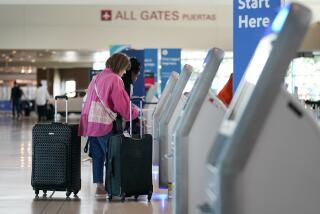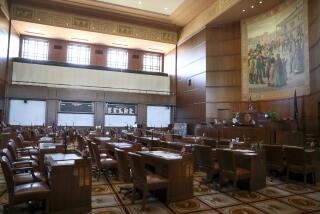Senate Votes to Ban Smoking on All Airliners
- Share via
WASHINGTON — In a major defeat for the tobacco industry, the Senate approved by voice vote Thursday a permanent ban on smoking on all domestic airline flights to protect the health of passengers and crews.
The ban, adopted by a powerful bipartisan majority as part of an $11.9-billion transportation appropriations bill, was far more extensive than an earlier House action making permanent an existing prohibition against smoking on flights of two hours or less.
Both proposals will be assigned to a Senate-House conference committee, which will decide what kind of airline smoking restrictions Congress will be asked to approve later this month or early in October.
The existing ban, which will expire next April unless Congress extends it, affects about 80% of domestic flights.
If the Senate version prevails, smoking would be banned on all flights between two cities within the United States--by foreign or domestic airlines--effective 90 days after the bill becomes law. But the House could refuse to go as far as the Senate on the controversial issue.
Rep. William Lehman (D-Fla.), who is expected to lead the House conferees, expressed no opinion about the broader prohibition approved by the Senate. But the House Rules Committee earlier this year had refused to allow a House vote on such a ban.
In the past, Rep. Lawrence Coughlin (R-Pa.), the ranking GOP member of Lehman’s subcommittee, has said that he wants to await the results of a government study on air quality in airline cabins before deciding on a broader ban.
A spokesman for the Tobacco Institute, Gary Miller, reacted with disappointment to the Senate action but expressed hope that a less sweeping prohibition will emerge from the conference committee. “This is not law yet,” he said. “We think that what comes out of conference will not be so extreme.”
However, the head of one group lobbying for the ban predicted that it would survive the Senate-House conference and become law.
“The Marlboro man got shot off his high horse,” said Ahron Leichman, president of the Washington-based Citizens Against Tobacco Smoke. He said that the Senate vote was probably the biggest defeat the tobacco industry ever suffered in Congress.
The Tobacco Institute led all other interest groups in paying speaking fees to members of Congress in 1988, giving honorariums totaling $123,800 to eight senators and 85 House members. An overwhelming majority of Democrats and Republicans crushed an incipient filibuster by tobacco-state senators by voting, 77 to 21, to shut off debate on the smoking issue.
When opponents of the measure got a favorable parliamentary ruling that would have killed the proposed ban, the Senate voted, 65 to 34, to overturn the decision and keep the issue alive.
Moments later, the ban was approved by voice vote.
“This is a victory for the majority of airline passengers who don’t want to breathe other people’s cigarette smoke,” said Sen. Frank R. Lautenberg (D-N. J.), chairman of the Senate Appropriations subcommittee on transportation. “We’re closing in on the day when the air will be cleared in all airline cabins in the United States.”
Lautenberg said that a study published in the Journal of the American Medical Assn. last February indicated that nonsmoking airline passengers are inhaling as much smoke as the smoking passengers.
Some flight attendants who do not smoke, he said, have suffered severe lung damage from inhaling smoke during airline flights.
Opponents of the provision said that it would violate the rights of the smoking minority and should not be enacted before the results of a $500,000 study by the Department of Transportation on air quality in airline cabins becomes available early next year.
“We made a decision without the report,” Sen. Wendell H. Ford (D-Ky.), one of the tobacco-state senators who opposed the ban, complained. “There’s something wrong about that.”
Sen. Jesse Helms (R-N. C.) complained bitterly that the ban was adopted in the form of legislation appended to an appropriations bill, supposedly in violation of Senate rules. “I don’t believe this was the Senate’s finest hour,” he said.
Sen. Ernest F. Hollings (D-S. C.), chairman of the Senate Commerce Committee, argued that approval of the smoking ban improperly invaded his committee’s jurisdiction. Hollings tried to kill the prohibition by raising a point of order against it. The Senate parliamentarian ruled in Hollings’ favor, but Lautenberg successfully appealed the decision.
An angry Hollings said that the Senate’s procedures for assigning committee jurisdiction have become a “farce” and added: “We’ve got government by political polls.”
* TOBACCO TAX: Gov. Deukmejian receives legislation implementing the tobacco tax initiative. Page 23
More to Read
Sign up for Essential California
The most important California stories and recommendations in your inbox every morning.
You may occasionally receive promotional content from the Los Angeles Times.












